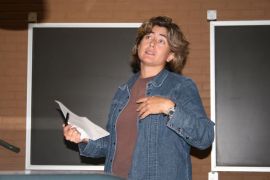Patricia Rodriguez can’t tell her life story without sharing her hardship. As she speaks of growing up in war-torn Chile, her intriguing green eyes convey an intensity only a victim of injustice could understand.

Rodriguez, assistant professor of politics at Ithaca College, was raised in Santiago, Chile, a place that endured many violent political uprisings during her youth in the 1970s. She said she knew all along, even as a child, that she wanted to be involved in human rights activism.
“In art class I always found my friends drawing houses with chimneys,” Rodriguez said. “My drawings were always of slums. That was what I wanted to draw.”
The professor’s interest in human rights spans outside of her classroom curricula. On Nov. 20, Rodrguez will bring students to Georgia to observe the School of the Americas, a counter-terrorism training facility.
Tom Shevory, chair of the politics department, said the trip will benefit all who attend.
“I like to encourage faculty to do things that are new and experimental and interesting, to find new educational opportunities for our students,” Shevory said. “It fits into the way we want our students to see the world.”
Rodriguez said she is eager for the trip, which she said could change students’ lives.
“I hope that my students can be involved in human rights activism not just for their careers here at Ithaca College, but for their lifetime,” Rodriguez said.
Despite the 17-hour drive, students have shown interest in the trip. Amnesty International and Muller Chapel will also bring students to The School of the Americas in November. Amnesty has taken students to see the school for the past two years.
The School of the Americas moved from Panama to Georgia in 1984. Ever since its move, there has been a movement to close the facility due to discoveries of corruption among its officers. Many of these officials and soldiers have been prosecuted for committing human rights violations.
Rodriguez tried to plan this trip last year and did not give up after experiencing difficulty so that it could occur this fall.
Rodriguez first came to the U.S. in 1986 to study political science at the University of Notre Dame. After teaching at the University of California, Santa Barbara, Rodriguez came to Ithaca College seeking a more personal connection with her students. She said that it was difficult adjusting when she first arrived here last fall, but is happy now and is especially pleased with the professor-student connection she has fostered.
“The fact that they come to my office is a great thing to me,” Rodriguez said.
Sophomore Toni Solberg took Rodriguez’s Politics and Society class last year and said she she appreciated Rodriguez because she knew she was teaching from her experience and knowledge.
“It became more real and relatable,” Solberg said. “You can see the passion in her eyes and you see the history in her eyes.”
Solberg said some of Rodriguez’s most powerful lectures discussed people living in the slums.
“She really tried to make us understand how difficult it is to be in some situations,” Solberg said.
Junior David Staley is currently taking Rodriguez’s Latin American Politics class and agrees that the professor’s personal history has made her teaching more powerful.
“It definitely gives what she’s saying more weight than say someone who didn’t have the type of background she has,” Staley said.
Staley said he is exicted by educational aspects of the School of The Americas trip
“I do really want to go on the trip,” he said. “Not as a protestor but as someone who is watching.
Rodriguez said she hopes that her students gain an unforgettable experience by visiting the School of the Americas in November.
“It’s a powerful emotional experience that you can’t just get from watching a movie,” Rodriguez said. “I hope that [students] are able to formulate their own opinions and to engage in whatever way — either a professional way or a personal way — and know about what’s happening in Latin America, because a lot of people don’t know.”




